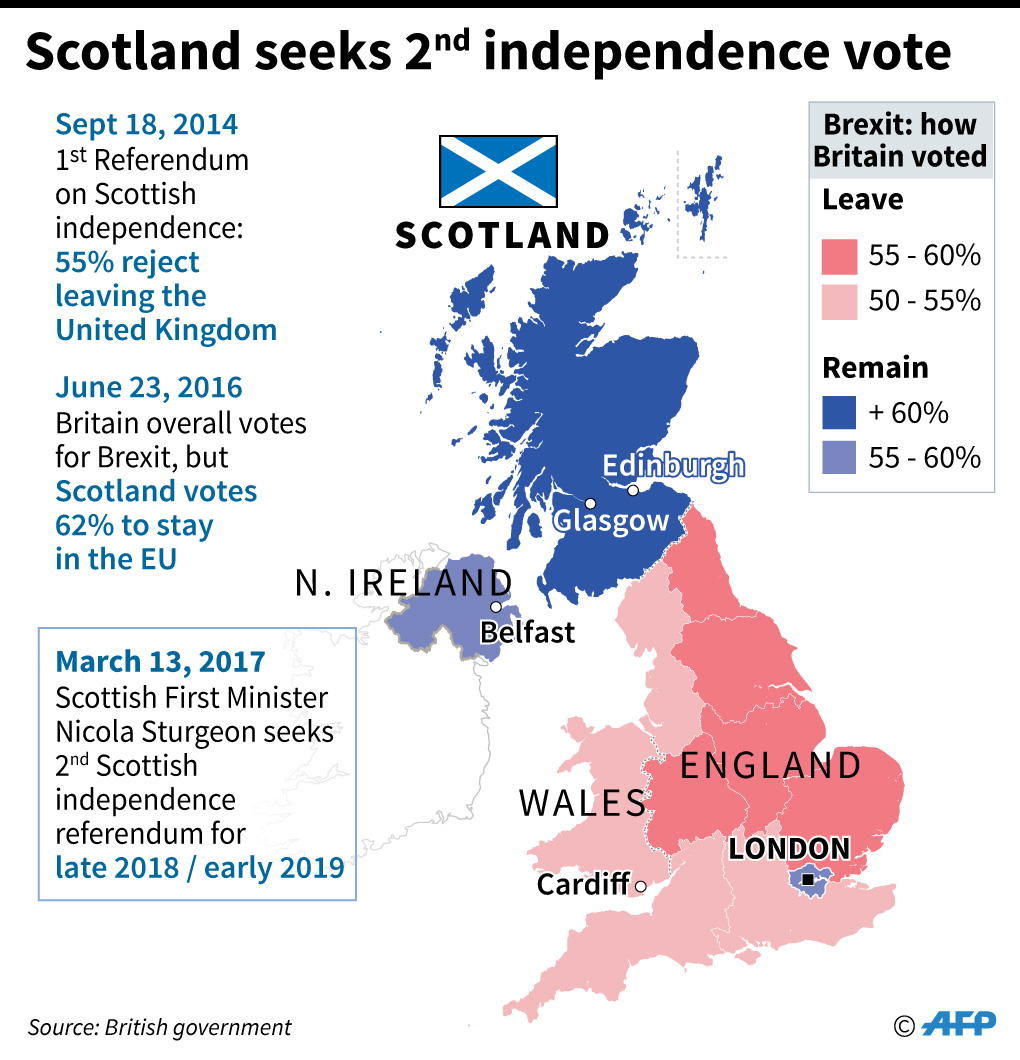

by Mark McLAUGHLIN with Robin MILLARD in London
Agence France-Presse
EDINBURGH, United Kingdom – Scotland’s announcement on Monday that it will begin preparations for a new independence bid raised the spectre of one of Brexit’s most feared consequences — the break-up of the United Kingdom.
First Minister Nicola Sturgeon said she would seek the semi-autonomous Scottish parliament’s authority next week to ask the UK government in London for the powers to hold a referendum before Brexit happens.
The decision heightened the uncertainty surrounding Britain as London braces for two years of tough negotiations to leave the European Union — itself an unprecedented step.
The Scottish move also triggered secessionist calls from nationalists in Northern Ireland and Wales.
Scottish voters rejected independence in a 2014 referendum by a majority of 55 percent but recent polls indicate support for the union in pro-EU Scotland is declining as Brexit looms.
A BMG survey for Scottish daily The Herald released Monday found that 52 percent were against breaking off from the rest of Britain, while an Ipsos MORI poll last week put the number at 51 percent.
The University of Aberdeen’s Scottish politics chair Michael Keating said the outcome was “wide open”.
But Sturgeon doesn’t want a vote immediately “because it’s the worst possible time to hold a referendum on independence: the price of oil is down and the economy is not doing very well,” he told AFP.
Mark Diffley, director of Ipsos MORI Scotland, said Sturgeon would be hoping that “a very different campaign than 2014, conducted during what looks like a hard Brexit, will persuade enough voters to win”.
An independent Scotland would be hugely dependent on oil revenues from the North Sea fields and secession would raise many pressing economic issues, including what currency the new state could adopt.
Sturgeon said the new independence referendum could be held between late 2018 and early 2019, once the outline of the Brexit agreement becomes clear but before Britain actually leaves the EU.
Keating warned that applying to get back into the EU would be “horrendously complicated” for an independent Scotland.
‘Worst possible time’
For months, Sturgeon has pushed for Scotland to be allowed to stay in the European single market even as the rest of Britain pulls out but on Monday she said she had been faced with “a brick wall of intransigence”.
“I will now take the steps necessary to make sure that Scotland will have a choice at the end of this process,” the pro-independence Scottish National Party (SNP) leader said of Brexit.
The British government retorted that it would seek a deal with Brussels for the whole of Britain including Scotland.
“Another referendum would be divisive and cause huge economic uncertainty at the worst possible time,” Downing Street said.
A spokesman cited the SNP’s claim that the 2014 vote “would decide the issue for a generation”, without however explicitly ruling out permission for Scotland to hold a vote.
Prime Minister Theresa May said: “The tunnel vision that the SNP has shown today is deeply regrettable.”
Ipsos MORI’s Diffley said May could refuse a referendum outright “with the risk that public opinion in Scotland will move firmly behind independence” or agree to allow Scotland to hold it only after Britain leaves the EU.
In the June 2016 Brexit referendum, 62 percent within Scotland voted for Britain to remain in the EU, but across the UK as a whole, 52 percent voted to leave.
‘End of the UK’?
The SNP runs a minority administration in Edinburgh, but with Green support they have the numbers required to back the call for a second referendum.
Scottish opposition leader Ruth Davidson said Sturgeon’s “utterly irresponsible” and “partisan” proposal “offers Scotland the worst of all worlds”.
“Her timetable would force people to vote blind on the biggest political decision a country could face,” the Conservative said.
Meanwhile Irish Republicans Sinn Fein called for a swift referendum on Northern Ireland leaving the UK and joining the Republic of Ireland.
“That needs to happen as soon as possible,” said Michelle O’Neill, Sinn Fein’s leader in Northern Ireland.
And Welsh nationalists Plaid Cymru said Sturgeon’s announcement meant the time had come for a national debate about Wales’s future.
Plaid Cymru leader Leanne Wood said Sturgeon’s announcement “could lead to the end of the UK as a state”.
